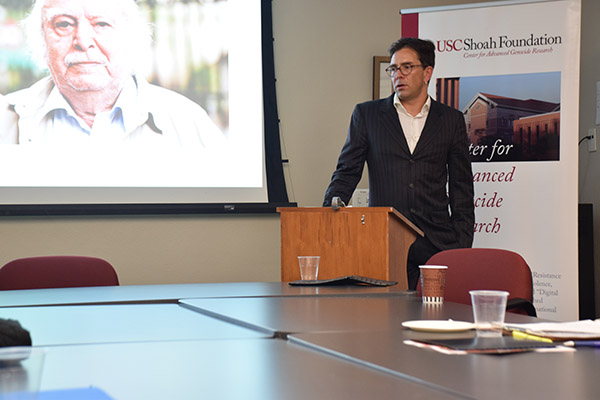Alexander Korb Researches Non-German Perpetrators in Visual History Archive

Just one month into his four-month tenure as USC Shoah Foundation Center for Advanced Genocide Research’s 2016-2017 Center Fellow, Alexander Korb has already made new discoveries about how the Holocaust played out outside Germany from testimony in the Visual History Archive.
Korb is director of the Stanley Burton Centre for Holocaust & Genocide Studies at the University of Leicester and scholar of the Holocaust in southeastern Europe.
He received his Ph.D. in history from Humboldt University in Berlin and since 2010 has been a lecturer in modern European history at the University of Leicester, UK. He has received research fellowships from Yad Vashem, Simon Wiesenthal Institute in Vienna and Imre Kertesz Kolleg Jena and has been published in a variety of peer-reviewed books and journals.
During his fellowship at USC Shoah Foundation from March to July, Korb will conduct research for his upcoming book project A Multitude of Lethal Attacks: Collaboration and Mass Violence in Southeastern Europe, 1940-1946. The book will investigate how local authorities in southern and eastern Europe, particularly Croatia, Serbia and Greece, collaborated with the Nazis and carried out their own acts of mass violence outside the epicenter of Nazi Germany.
Korb gave his fellowship lecture at USC on Thursday, April 20 – a date he noted in the beginning of the lecture as one of infamy, Adolf Hitler’s birthday.
He said that the typical view of perpetrators of the Holocaust outside Nazi Germany is that they were “puppets” of the Nazi regime, simply carrying out directives from Berlin without much autonomy or other motivations.
However, many countries countries in the Balkans and central Europe were not even under Nazi control, yet they carried out mass violence anyway. Though some of these countries were occupied by Germany at various times, they all still enjoyed a level of independence that meant they could control when, where and how they committed genocide against their Jewish populations. The question is, why?
In fact, Korb said, these countries had motives of their own for participating in the Final Solution. They may have wanted to develop or maintain relationships with other countries, including Germany, by appeasing Hitler’s plan. They also saw the Nazis’ wide-scale destruction of the Jewish population, and other minority groups, as an opportunity to do the same within their own borders to achieve their own ethnic homogeneity, Korb said.
“They wanted to partake in discourses of the future of European minorities,” Korb said.
Korb gave examples from Romania and Croatia of what exactly this non-German collaboration looked like. In 1940, the Romanian militia carried out a pogrom against Slavs, Roma and Jews – without any German perpetrators actually on the ground.
In Croatia, the fascist government expelled up to 300,000 Serbs from the country, and the civil war that followed sparked local resistance which radicalized perpetrators and created the infrastructure necessary to put a system of Jewish and Roma extermination into place.
“It’s remarkable how quickly the persecution of Jews and Roma takes place,” Korb said.
In fact, civil wars in many countries generated resistance and partisan activities. Korb found testimonies in the Visual History Archive from the Polish/Ukrainian border village of Hanaczow that described an event he’d never researched before. In their testimonies, several survivors recount that as a result of the Ukrainian militia’s attempt to expel Poles from the area, the Polish and Jewish population formed an alliance, along with Soviets, to turn the village into a fortress and defend it against the Ukrainian militia.
“These local case studies help us understand the dynamics on the ground,” Korb said. “We wouldn’t know about this battle if it wasn’t for these survivors.”
The testimonies will help Korb in his quest to “Europeanize” the Holocaust, moving away from a more German-centric perspective to shed light on the other places where so much of it actually occurred, he concluded.